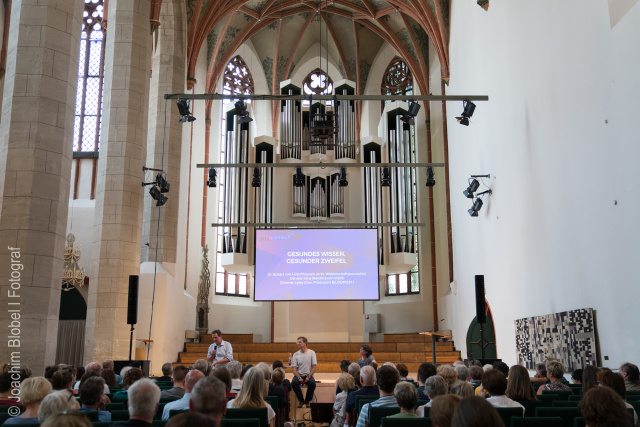
This year SILBERSALZ is under the motto "Home Earth". Within the framework of a multifaceted lecture program, renowned experts from science, research, and economics will speak on 19 June 2020 about the state of the planet and our common future. They will provide food for thought on the possibilities of transformation with regard to biodiversity, climate change and, of course, how to deal with pandemics such as COVID-19 and their causes - and enter into a discussion with our visitors on-site and viewers online, as all talks will be broadcast via live stream. The Livestream in cooperation with the MDR is free of charge and can be seen on the SILBERSALZ social media channels – on Facebook | Instagram | Twitter.
All talks are held in German.
We are looking forward to this following talks:
Our planet in transition (Unser Planet im Wandel)
Prof. Dr. Antje Boetius starts the SILBERSALZ lecture program and introduces this year's festival motto "Home Earth". In her talk, she looks at those transformations of our planet that were decisively caused by humankind and are now manifesting themselves in climate change and threatened biodiversity on land or sea.
Speaker:
Prof. Dr. Antje Boetius, Director of the Alfred Wegener Institute (AWI) and SILBERSALZ Head of Science
Home Earth. Biodiversity and its protection. (Heimat Erde. Biodiversität und ihr Schutz.)
A pandemic doesn’t occur for no reason. But what made the momentous development of COVID-19 possible? International researchers* pointed out the connection between epidemics and the global destruction of ecosystems, the extinction of species, and shrinking biodiversity. Unchecked deforestation, the uncontrolled expansion of agriculture and intensive land use, mining, infrastructure development, and the exploitation of wild species created the conditions for a disease-causing virus to spread from the animal world to humans.
Speaker:
Prof. Dr. Josef Settele, Helmholtz Centre for Environmental Research (UFZ), Member of the German Centre for Integrative Biodiversity Research (iDiv), IPBES author
Fritz Habekuss, Editor at Die Zeit, author of “Über Leben. Zukunftsfrage Artensterben: Wie wir die Ökokrise überwinden” (together with Dirk Steffens)
Health in Transition - Dialogue around Covid-19. (Gesundheit im Wandel – Dialog um Covid-19.)
It is not only the spread of the coronavirus that makes it clear to us that rapid pandemics are not a historical artifact, but also possible in our modern age. In this dialogue, we bring together the present and the past and classify the current epidemic events and containment strategies.
Speaker:
Prof. Dr. Lothar H. Wieler, President of the Robert Koch Institute
Prof. Dr. Dr. Alfons Labisch, Medical historian, Rector emeritus of the Heinrich Heine University Düsseldorf, Honorary Professor of the Beijing Foreign Studies University
Kai Kupferschmidt, science journalist, Riff-Reporter, Correspondent for the magazine "Science”
Strategies for the future - transformations in the face of climate change (Strategien in die Zukunft – Transformationen angesichts des Klimawandel)
Reduced pollutant emissions, clean waters - "Nature is healing"... But can the current corona crisis have positive effects on our planet? Critics* warn against being too optimistic, because a short-term reduction in pollutant levels does not necessarily mean a long-term gain for climate protection. What is needed are strategies for sustainable transformation, overcome barriers, and food for thought. Because, as science confirms: we need to fundamentally rethink.
Speakers:
Prof. Dr. Maja Göpel, Secretary General of the German Advisory Council on Global Change (WBGU)
Prof. Dr. Gerald H. Haug, President of the German Academy of Sciences Leopoldina – National Academy of Sciences
Prof. Dr. Antje Boetius, Director of the Alfred Wegener Institute (AWI) and SILBERSALZ Head of Science
The health of our guests, visitors, and employees is our top priority. The organisation and implementation of the festival program is therefore based on the permitted hygiene and distance measures to limit the corona virus'.